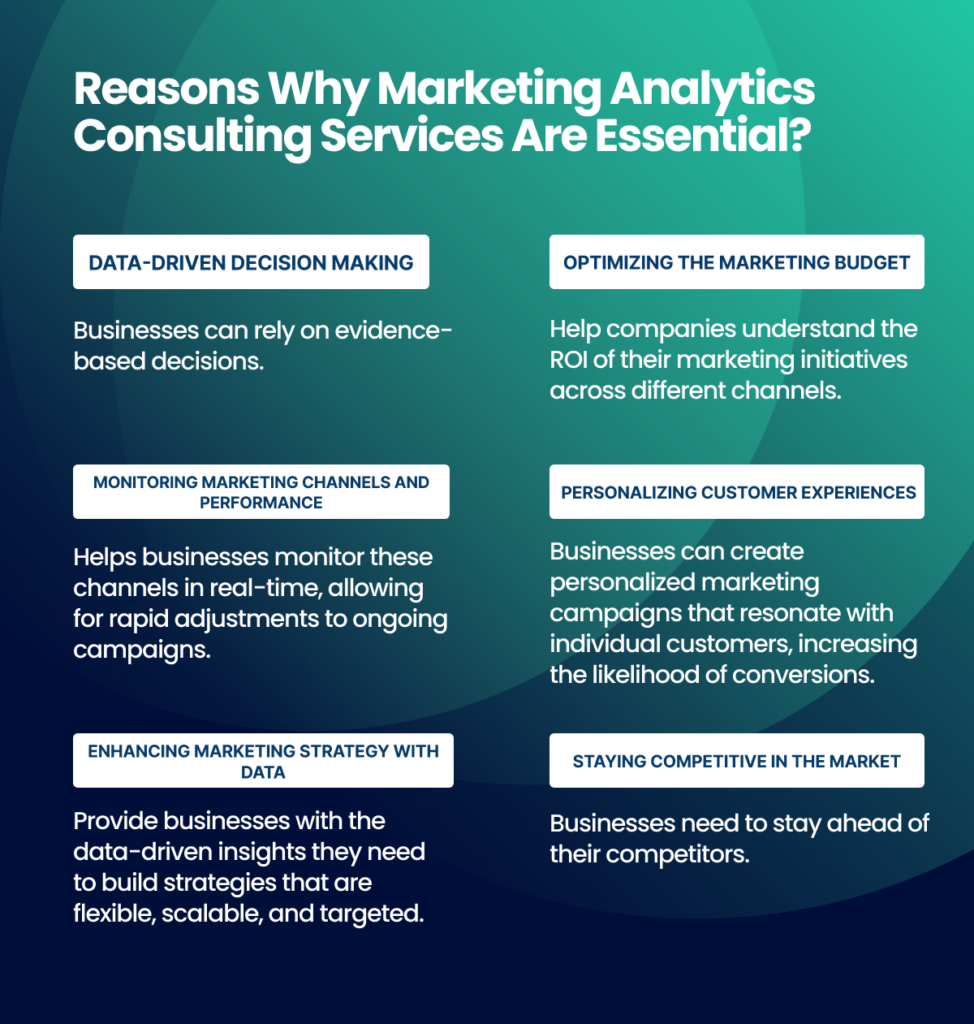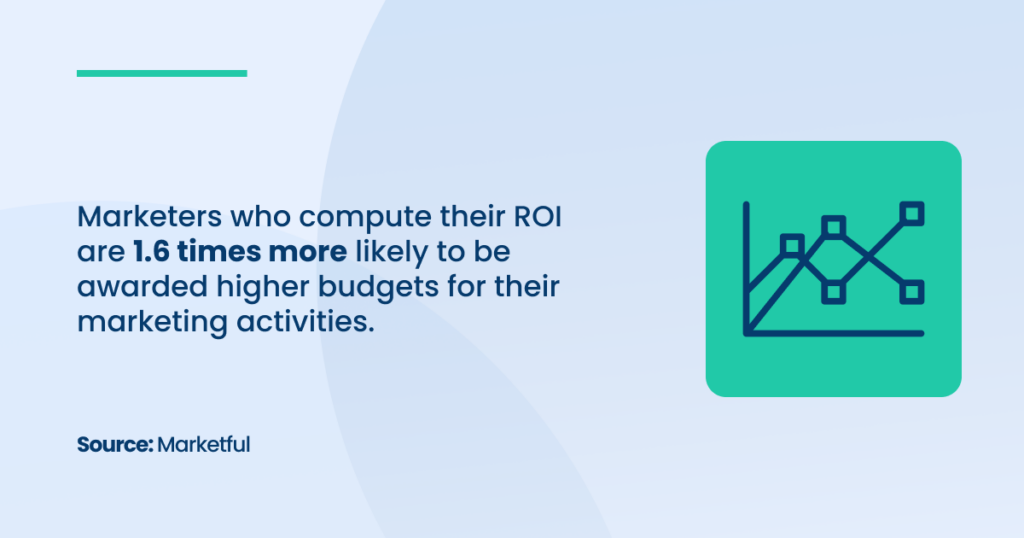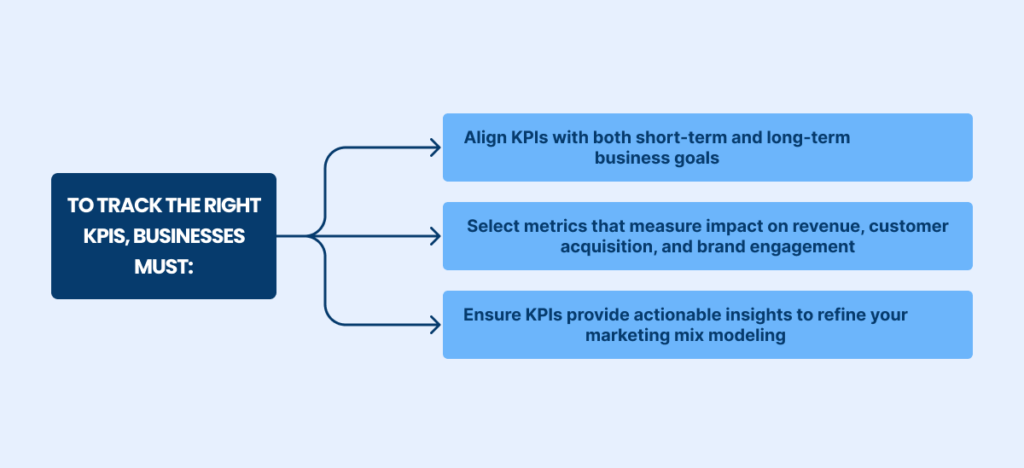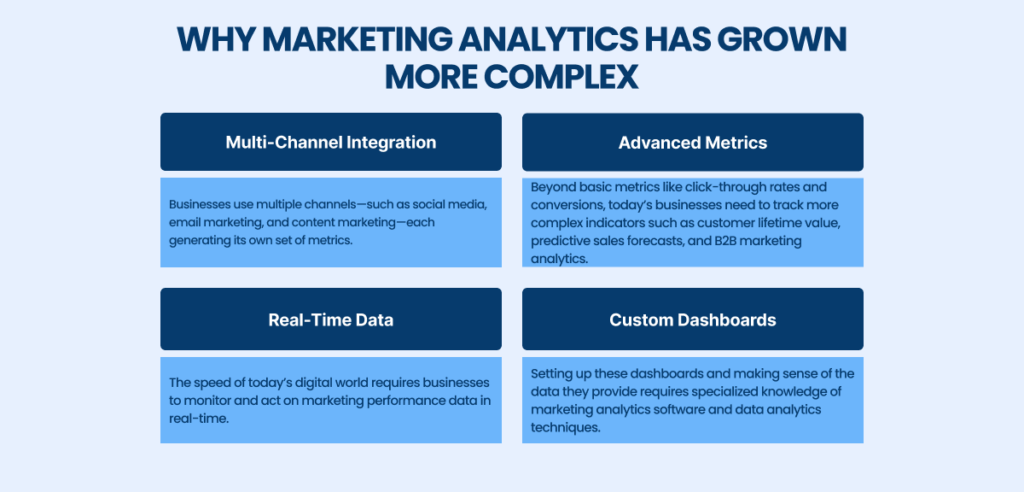“Data powers everything that we do,” highlights Jeff Weiner, Executive Chairman of Linkedin.
Marketing analytics consulting is the art of turning raw data into actionable insights.
Think of it like solving a marketing puzzle. By using data-driven insights, businesses can make more intelligent choices, improve their marketing plans, and achieve measurable success.
The global big data analytics market size was valued at USD 307.51 billion in 2023.
Source: Fortune Business Insights
The market is projected to grow from USD 348.21 billion in 2024 to USD 924.39 billion by 2032, exhibiting a CAGR of 13.0% during the forecast period.
Businesses that partner with an expert Marketing Analytics & Reporting Agency can leverage this explosive growth to stay ahead of the competition and make data-driven decisions.
The blog post will cover what marketing analytics is and how it can help businesses thrive in today’s competitive landscape.
What is Marketing Analytics Consulting?
Marketing analytics consulting involves expert guidance in collecting, analyzing, and interpreting data from various marketing activities to enhance a company’s marketing performance.
Source: Share of projects using marketing analytics before a decision is made, Statisa
Marketing analytics consultants provide businesses with the insights needed to make informed decisions, optimize their marketing strategy, and maximize the return on marketing spend.
At its core, marketing analytics is the process of measuring and analyzing marketing performance to improve future efforts.
This involves using marketing analytics tools and advanced data analytics techniques to assess the effectiveness of different marketing channels—such as digital ads, email campaigns, social media, and more.
By turning vast amounts of marketing data into actionable insights, businesses can refine their strategies and better allocate their marketing budget.
Why It’s Important for Businesses Today
In today’s data-driven landscape, marketing analytics consulting has become crucial for businesses of all sizes.
With countless marketing tools and digital marketing analytics platforms available, it’s easy to collect massive amounts of data—but without proper analysis, this data becomes meaningless.
That’s where a solid marketing analytics consulting service comes in.

Sign 1: Your Marketing Data Is Scattered Across Multiple Platforms
In today’s multi-channel marketing environment, businesses rely on a variety of tools and platforms to track and execute their marketing efforts.
While this creates opportunities for reaching a broader target audience, it also creates a significant challenge: fragmented data.
When your marketing data is scattered across different platforms, it becomes difficult to analyze overall performance, identify trends, and make informed decisions.
This is where marketing analytics consulting can play a crucial role.
The Problem with Fragmented Data
Fragmented data occurs when different systems or marketing analytics tools are used for various marketing activities—such as email marketing, social media campaigns, paid advertising, and content marketing.
Each platform generates its own set of metrics and reports, making it hard to consolidate this information into a single, comprehensive view.
For example, a company might use one tool to track website traffic, another for social media performance, and yet another for email campaign metrics.
While these tools provide valuable insights individually, they don’t offer a holistic view of marketing performance. Without a unified dataset, businesses face several challenges:
- Inconsistent Reporting: Each platform may measure and report data differently, making it difficult to compare results across channels.
- Missed Insights: Fragmented data makes it hard to detect patterns or correlations that could significantly improve your content marketing strategy or overall marketing strategy.
- Inefficient Decision-Making: Marketing teams spend valuable time trying to piece together fragmented reports instead of focusing on improving marketing initiatives.
Ultimately, fragmented data leads to lost opportunities, as businesses are unable to make the most of their data-driven insights.
How Consulting Can Help: Centralizing Data for Better Insights
Marketing analytics consulting services help solve the issue of fragmented data by centralizing it.
Marketing consultants specialize in integrating disparate data analytics and reporting systems into a unified platform that delivers a complete view of marketing performance.
Here’s how consulting can help:
- Data Consolidation: A marketing consultant can assist in bringing all of your marketing data together, regardless of the platform it’s coming from. They use marketing analytics software that pulls data from various tools and centralizes it in one place, providing a comprehensive and accurate picture of marketing activities.
- Improved Data Accuracy: By centralizing data, businesses can eliminate discrepancies that often arise from using multiple platforms with different metrics. This ensures a higher level of data accuracy, which is critical when making decisions about your marketing initiatives.
- Actionable Insights: When data is centralized, businesses can use advanced data analytics techniques to gain insights that were previously impossible to identify. For instance, combining social media and website analytics might reveal which platforms are driving the most engagement and conversions, allowing you to refine your solid marketing strategy.
- Streamlined Reporting: A centralized data system offers simplified data analytics and reporting, allowing marketing teams to focus on interpreting the results and optimizing their efforts instead of spending time gathering data.
Sign 2: You Struggle to Measure ROI from Your Campaigns
Many businesses find it challenging to measure the return on investment (ROI) from their marketing campaigns.

Understanding how marketing efforts contribute to revenue is critical for optimizing marketing spend, yet without a clear way to measure ROI, businesses risk wasting their marketing budget on ineffective campaigns.
Challenges in Measuring Marketing Performance
There are several challenges businesses face when trying to measure marketing performance:
- Multiple Touchpoints: Today’s customer journey is far from linear. Potential customers may interact with your brand through various channels—social media, email, ads, blogs—before making a purchase.
Tracking the effectiveness of each touchpoint and attributing conversions accurately can be complex without proper digital marketing analytics.
- Inconsistent Metrics: Each marketing analytics tool often measures success differently. For example, social media tools may focus on engagement, while Google Analytics prioritizes conversions and website visits.
This makes it difficult to create a unified view of performance that aligns with your key performance indicators (KPIs).
- Unclear Attribution: Attribution models are used to assign credit for a conversion across the multiple touchpoints in a customer’s journey.
However, choosing the right attribution model is tricky, and without it, businesses may fail to understand which of their marketing initiatives are driving the best results.
- Long-Term vs Short-Term Results: Some marketing tactics, like content marketing or SEO, often take time to yield results, making it harder to measure their impact on ROI in the short term.
Businesses may struggle to see the value of these efforts without robust marketing analytics software in place.
How Consulting Improves ROI Measurement
Marketing analytics consulting can resolve these challenges by providing businesses with the tools and expertise needed to accurately measure ROI.
Consultants use advanced marketing analytics methodologies to ensure that every marketing dollar is spent wisely and that businesses can see a clear return on their investments.
Here’s how consulting can help:
- Customized KPIs: A marketing analytics consultant works with businesses to define KPIs that align with their goals and strategy. By focusing on the right KPIs, businesses can track performance in a way that directly correlates with ROI.
For example, a business may choose to focus on lead generation, conversion rates, or customer lifetime value, depending on their specific objectives.
- Attribution Models: One of the key services offered by marketing analytics consulting services is helping businesses choose and implement appropriate attribution models.
Consultants use data analytics techniques to assign proper credit to each touchpoint in the customer journey, providing a more accurate picture of which channels and campaigns are contributing most to revenue. This ensures that businesses can better allocate their marketing budget.
- Real-Time Tracking: Consultants help businesses implement marketing analytics software that tracks performance in real-time, giving marketing teams immediate insights into the effectiveness of their efforts.
This allows businesses to quickly identify underperforming campaigns and make adjustments to improve ROI.
- Cross-Channel Insights: By using marketing analytics consulting services, businesses can gain a clearer understanding of how different channels contribute to overall performance.
For instance, combining insights from paid ads, social media, and content marketing can reveal which combination of efforts leads to the highest conversions.
Consultants can create detailed reports that highlight the ROI of each channel, enabling more informed decisions on future marketing spend.
- Benchmarking and Industry Insights: One of the major benefits of working with a marketing analytics consulting firm is access to industry-specific benchmarks and insights. Consultants bring a wealth of experience from working with other businesses in your industry, allowing you to see how your performance stacks up against competitors.
This can help refine your solid marketing strategy and guide investment decisions to maximize ROI.
- Improved Reporting: Comprehensive data analytics and reporting services help businesses present ROI data in a way that’s easy to understand.
Consultants help create dashboards that visualize performance metrics, making it easier for decision-makers to see the direct impact of their marketing activities.
Sign 3: You’re Unsure Which KPIs to Track
One of the most common challenges businesses face in today’s data-driven landscape is determining which Key Performance Indicators (KPIs) to track.
With countless metrics available across various marketing platforms, it can be overwhelming to pinpoint the ones that matter most to your business goals.
Tracking irrelevant or low-impact KPIs can lead to misguided decisions, misallocated resources, and stagnant business growth.
The Importance of Tracking the Right Metrics
KPIs are essential to measuring the success of your comprehensive marketing plan. They provide quantifiable insights into how your marketing efforts are performing, helping you to adjust strategies in real-time.
However, not all metrics are created equal. Focusing on vanity metrics—those that look impressive but provide little insight into actual performance—can obscure the true impact of your marketing activities.
Tracking the right KPIs can help answer critical questions such as:
- How effectively are we reaching our target audience?
- Which marketing channels contribute the most to conversions?
- Are we seeing a return on our marketing investments?
These questions are essential to understanding whether your business goals are being met and identifying areas where your marketing efforts may need optimization.

However, selecting the most meaningful KPIs is not always straightforward. Different marketing activities require different metrics, and without a deep understanding of marketing analytics, businesses can struggle to make the right choices.
How Consultants Help You Define Meaningful KPIs
This is where marketing analytics consulting becomes invaluable.
Marketing analytics consultants use advanced data analytics techniques and their industry expertise to help businesses define KPIs that align with their specific business goals. Here’s how consultants help in this process:
Tailored KPI Selection: One size does not fit all when it comes to KPIs. A marketing analytics consultant first takes the time to understand your unique business objectives, whether it’s increasing brand awareness, driving sales, or improving customer retention.
From there, they help you choose KPIs that directly correlate with your business growth goals. For instance, if customer acquisition is a key goal, KPIs such as cost-per-acquisition or customer lifetime value will be more relevant than general engagement metrics.
Data-Driven Insights: With expertise in digital marketing analytics and marketing analytics tools, consultants can dig into your marketing data to identify patterns and trends that indicate which KPIs are worth focusing on.
For instance, consultants can use marketing mix modeling to show how each component of your marketing strategy—whether it’s content marketing, paid advertising, or social media—impacts your overall performance. This enables you to focus on the metrics that matter most.
Real-Time Monitoring: One of the benefits of working with a marketing analytics consulting service is access to marketing analytics software that provides real-time tracking of your KPIs.
Consultants can set up dashboards and data analytics and reporting systems that allow you to monitor your marketing performance as it happens. This means you can make swift adjustments to your strategy when necessary, ensuring your KPIs are always aligned with your business objectives.
Predictive Analytics: Consultants also use data analytics techniques such as predictive analytics to forecast future performance. This helps you stay ahead of the curve by understanding how current trends in customer behavior and market conditions will likely impact your future KPIs.
By being proactive rather than reactive, you can optimize your marketing strategies more effectively.
Sign 4: Your Competitors Seem to Be Outperforming You
Another clear sign that you may need marketing analytics consulting is when you notice that your competitors are consistently outperforming you.
In the rapidly evolving digital landscape, falling behind competitors can mean losing market share, relevance, and potential revenue. However, identifying why your competitors are doing better and how to bridge that gap is not always easy.
Identifying Gaps in Your Marketing Strategy
When competitors are ahead, it’s often because they are executing more effective strategies or adapting more quickly to changes in the market. To catch up, you need to understand the exact areas where your comprehensive marketing plan is falling short.
Here are some common gaps businesses often overlook:
- Ineffective Channel Allocation: Your competitors might be using the right channels to engage your shared target audience. For instance, they might be investing more effectively in paid search, social media, or email marketing.
- Customer Behavior Insights: Your competitors might have a better understanding of your mutual customers’ preferences and behavior. They may be creating more personalized and engaging content, leading to higher customer retention.
- Inadequate Content Marketing: Content is a major driver of engagement and lead generation. If your competitors are producing more targeted and valuable content, it can make a huge difference in their ability to capture your potential customers.
- Faster Adaptation to Market Changes: Your competitors might be using digital marketing analytics to identify trends and customer behavior shifts before you do, allowing them to pivot their strategy quickly.
Identifying these gaps requires in-depth analysis of your marketing performance, your competitors’ activities, and market conditions—all of which can be overwhelming without expert help.
How Consultants Help with Competitor Benchmarking and Analysis
Marketing analytics consulting services play a key role in helping businesses analyze their competitors and close performance gaps.
- Competitor Benchmarking: Consultants use data analytics and reporting tools to conduct thorough competitor benchmarking. They analyze your competitors’ marketing strategies across various channels to identify what’s working for them and why.
This might include looking at their social media performance, content marketing efforts, SEO rankings, and customer engagement rates. Marketing analytics tools can reveal valuable insights into your competitors’ strengths and weaknesses.
- Gap Analysis: Using the data gathered through benchmarking, marketing consultants perform a gap analysis to identify where your marketing strategy is falling short. For example, if competitors are generating more organic traffic through content marketing, consultants can show how your content strategy might need to be adjusted to increase your visibility.
They also help determine whether you are targeting the right customer segments and using the best channels to reach them.
- Actionable Insights for Improvement: Once the gaps have been identified, consultants provide actionable recommendations to improve your marketing mix modeling.
They might suggest reallocating your budget to high-performing channels, refining your content marketing to engage your target audience more effectively, or using marketing analytics software to track competitors’ movements in real time.
These insights ensure that your marketing efforts are more competitive and better aligned with your business goals.
- Competitor Trend Analysis: By leveraging marketing analytics tools, consultants can identify trends that your competitors are capitalizing on before you’ve even noticed them.
For instance, a competitor might start seeing success with video content while your strategy remains focused on blog posts.
A marketing analytics consulting service can help you spot these shifts and adjust your approach accordingly, ensuring that you stay competitive.
- Predictive Analytics for Competitive Advantage: Consultants can also employ data analytics techniques like predictive analytics to anticipate future competitor strategies.
This forward-looking approach enables you to adjust your comprehensive marketing plan proactively, putting you in a position to outperform competitors in the long term.
Sign 5: Your Marketing Team Lacks Advanced Analytics Expertise
In today’s digital landscape, marketing has become increasingly data-driven, and businesses that fail to leverage the power of analytics often struggle to stay competitive.
One common challenge businesses face is that their internal marketing team may lack the advanced analytics expertise necessary to harness the full potential of their marketing data.
This gap can prevent businesses from effectively measuring performance, optimizing campaigns, and making data-driven decisions that drive growth.
The Growing Complexity of Marketing Analytics
The field of marketing analytics is becoming more complex by the day.
With the rise of multi-channel marketing, advanced technologies, and a wide range of marketing analytics software tools, it’s no longer sufficient to track simple metrics like website visits or social media engagement.
Today’s marketing landscape requires a deep understanding of advanced techniques such as predictive analytics marketing, attribution modeling, customer segmentation, and real-time data analysis.

Without advanced analytics expertise on your marketing team, it’s easy to get lost in the overwhelming amount of data available, leading to suboptimal marketing decisions and missed opportunities.
How Consulting Provides Expertise Without Hiring In-House
If your team lacks advanced analytics skills, hiring in-house experts can be costly and time-consuming. Fortunately, marketing analytics consulting services offer a more flexible and efficient solution.
By working with an external marketing analytics consulting firm, you can access the expertise you need without the overhead of hiring full-time employees.
Here’s how consultants can fill the gap:
- On-Demand Expertise: Marketing analytics consultants bring specialized knowledge and experience to your business. They understand how to navigate the complexities of modern B2B marketing analytics, content marketing analytics, and email marketing analytics, enabling your business to track performance accurately and make data-driven decisions.
- Access to Advanced Tools: Consultants use cutting-edge marketing analytics software and tools to integrate and analyze your marketing data. They can implement advanced tracking systems and reporting dashboards, giving you insights into your marketing ROI across all channels.
- Cost-Effective: Instead of hiring an in-house analytics team, which can be expensive, consultants offer a more cost-effective way to access expert knowledge. You only pay for the services you need, and you avoid the additional costs associated with recruiting, training, and onboarding new employees.
- Custom Solutions: Each business has unique needs when it comes to marketing analytics. Consultants can develop customized strategies based on your business goals, helping you optimize your social media engagement, email campaigns, and content marketing efforts. They also provide ongoing support, ensuring your team understands how to use the data to improve performance.
By leveraging marketing analytics consulting services, businesses can gain access to advanced analytics capabilities without the need for a permanent in-house team.
This allows companies to stay competitive and make smarter decisions based on data, all while saving time and resources.
Sign 6: You’re Missing Data-Driven Decision Making
In today’s fast-paced digital world, data-driven decision-making is no longer a luxury—it’s a necessity.
Businesses that rely on intuition or guesswork are at a significant disadvantage compared to those that use data to guide their marketing strategies.
If your business isn’t leveraging analytics data to make informed decisions, it’s a clear sign that you’re missing out on opportunities for growth and optimization.
Why Data-Driven Marketing Matters
Data-driven marketing is about using insights derived from marketing analytics to shape your strategy, campaigns, and content. Instead of relying on assumptions or outdated methods, data-driven marketing enables businesses to:
- Optimize Marketing Spend: By analyzing marketing ROI, businesses can allocate their budget more effectively. Data reveals which channels—whether it’s social media, email, or content marketing—are driving conversions and which are underperforming, allowing for smarter allocation of resources.
- Improve Customer Targeting: Data-driven decision-making helps businesses understand their customers on a deeper level. By analyzing customer behavior, social media engagement, and content consumption patterns, businesses can tailor their messaging and campaigns to better resonate with their target audience.
- Increase Conversion Rates: With insights from predictive analytics marketing, businesses can identify patterns in customer behavior and predict which marketing tactics are most likely to lead to conversions. This enables more personalized campaigns that meet customers where they are in the buyer’s journey.
- Adapt to Market Changes: One of the biggest advantages of data-driven marketing is the ability to respond to changes in real time. Whether it’s a shift in consumer preferences or a new trend in the industry, data-driven businesses can adjust their social media posts, content, and ads on the fly to maintain relevance and effectiveness.
- Measure Performance Accurately: Data-driven marketing eliminates the guesswork from performance measurement. With tools that provide real-time analytics data, businesses can track KPIs such as social media engagement, email open rates, and conversion rates. This ensures they can measure the effectiveness of their marketing efforts and make adjustments as needed.
Overall, adopting a data-driven approach allows businesses to be more efficient, strategic, and proactive in their marketing efforts.
Partner with [A] Growth Agency for Your Marketing Analytics & Reporting Strategies
Marketing analytics and reporting consultancy is no longer a luxury but a necessity.
By harnessing the power of data, businesses can gain a competitive edge and make informed decisions.
[A] Growth Agency will support you in all possible ways.
From developing effective marketing strategies to executing campaigns that drive results, our team of experts will be your trusted partner. We’ll help you understand your target audience and track your progress.
Excellence is our standard. Remember this and go ahead!

